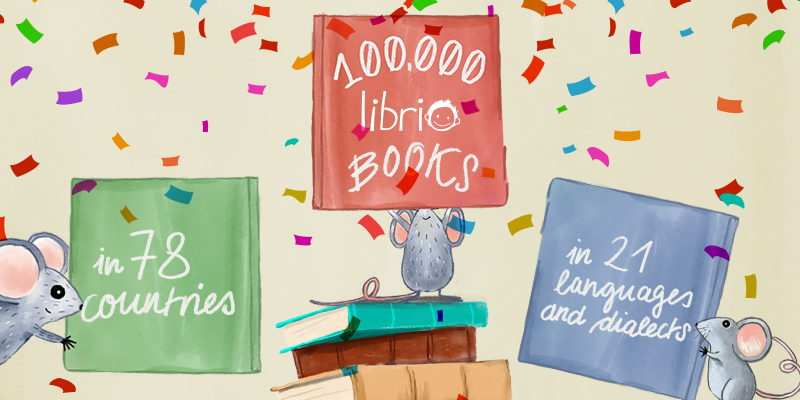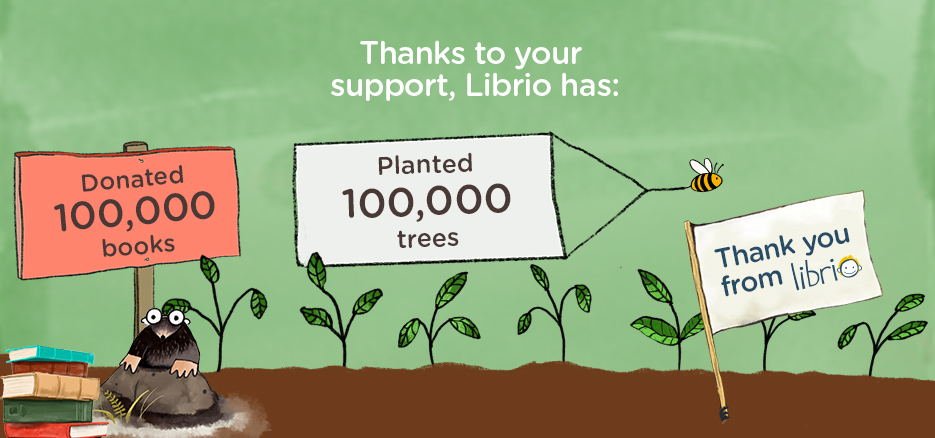Why we don’t like talking about planting trees. But planted 100,000 anyway.
8 minute readIs there such a thing as too much philanthropy?
“Do you have to do so much good stuff? It makes you sound guilty, like you’re trying to cover something up.”
We were sitting with our start-up coach in 2018, trying to figure out how best to put our values into a sentence which didn’t turn into a tongue twister.
This is what we had so far:
“We print our products on 100% recycled paper and donate a book for every one sold and plant a tree every time we create a product.”
It wasn’t very snappy. And he was right. Perverse as it is to say it, it sounded like we did too much good stuff.
Which made us think.
How can there possibly be such a thing as a company doing “too much” good stuff?
Start with why
As Simon Sinek says, how or what you do is not nearly as important as why you do it.
So why is Librio doing good stuff?
Is it because it’s just a marketing gimmick to persuade people to buy stuff?
It feels disingenuous to give an example of a company in this bucket, but there are plenty of “you buy one / we give one” products which support less than transparent causes, in some cases even potentially doing more harm than good.
Is it because we feel guilty and we’re trying to cover something up?
Hello oil and tobacco company CSR (Corporate Social Responsibility) programs.
Is it because we make products which will have a direct impact on a specific issue if you buy them?
For example locally-sourced organic foods
Is it because we founded Librio as a way of supporting a specific cause?
For example TOMS was founded on the premise of providing shoes to children in Argentina who the founder had seen first-hand on a visit.
Is it because we feel it’s the duty of any company in business today to operate in a way which is sustainable and forward looking?
Yes.
We founded Librio to create beautiful products for our children. Products which we would want to buy ourselves.
Doing business in a way which improved the world which those children would one day inherit was a vital component from the very beginning, but it was not the reason we started Librio in the first place.

More than a book
Once we clarified the Why, it simplified the messaging.
We didn’t want to say “Buy our books because we plant trees” or “Buy our books because they’re printed on 100% recycled paper” or “Buy our books because we donate books”, because those things aren’t why Librio exists.
We did want to say “Buy our books, because we think they’re fabulous”. And if you want to find out more about how they’re produced, or which causes we support, we’ll provide you that information, but that’s not the primary reason for buying our products.
And so, instead of summing up our values in a snappy sentence which detailed all the good stuff we do, we settled on the phrase “More Than A Book”. This encapsulates the way our products are produced and the causes we support in one abstract phrase without sounding Holier-Than-Thou.
Finally, to return to our original question. If we’re not doing the good stuff in order to persuade people to buy our products, the answer to how much good stuff we should do can never be “too much”. It can only be “as much as we can”.

What Librio’s commitments really mean
It feels somewhat insincere to say “We decided not to talk too much about all the good stuff we do” and then to write a 1,500 word blog post about it, but we feel there are certain occasions where it’s appropriate to look more in depth at what we do.
This month, we hit our 100,000th book sold, which means we also planted our 100,000th tree and donated our 100,000th book. That makes us extremely proud and we feel that reaching this landmark is a good time to reflect on what exactly those numbers mean.
In a world where every company needs to have a green or social angle, it’s difficult for consumers to distinguish between companies which want to make a genuine difference and those that are just “greenwashing” - looking for a CSR box to tick in the PR column.
We always aim to communicate with full transparency at Librio, so we don’t say “we donate 10% of our profits to charity”, because those profits can be manipulated as high or low as we want.
However, even concrete terms like “We plant a tree” or “We donate a book” are still fuzzy. What do they actually mean? Does Librio plant trees ourselves? Do we hand out books to children in Cambodia ourselves?

In reality, it means this:
To donate a book via Room To Read, we donate $1 for every book we create.
To plant a tree via Trees for the Future, we donate $0.10 for every book we create.
That means, for the 100,000 books we’ve sold, we’ve donated a whopping $110,000 to our partners.
The question still remains of “Does it really cost that amount for the charities to plant a tree and donate a book?”
The answer is “yes”, “no”, “maybe”. They’re both serious charities with decades of experience and hundreds of millions of dollars raised in donations. They are vetted by the highest financial authorities in the US and are extremely highly rated by the independent organisation Charity Navigator, so we have reason to believe the claims to be true. One thing is certain that their expertise and network allows them to do their work far more effectively than if we tried to undertake it ourselves.
In fact, the precise numbers are not as important as the impact those donations have and we specifically chose our two partners because they are not just box-ticking charities. Again, it starts with why. Are these charities there to facilitate companies like ours to tick a donation box? Or are they striving to improve the lives of those their charity supports?
In both cases, the two charities we support run programs which are part of a more holistic approach to ensure that every donation has the biggest and longest-lasting impact possible.
Room to Read don’t just donate books, they do so as part of concerted, government-level programs aimed at keeping children in school through increased literacy.
Trees For The Future doesn’t just plant trees, they do so as part of a wide-ranging program of regenerative agriculture, allowing local communities to farm their way to independence.
And so why don’t we like talking about planting trees?
Since we started Librio in 2017, we’ve seen more and more marketing campaigns on social media saying “For every X, we plant one tree”, “The water bottle that plants trees”, “The sock that plants trees”, “The chainsaw that plants trees”. Some companies even have trees in their logo because it’s such a core part of their messaging.
Don’t get us wrong. Every tree planted (properly) is a win, especially when it’s considered one of the most effective ways of fighting climate change and some of those companies, such as 10tree, have affected remarkable change (43 million trees planted to date).
However, while many of these companies are no doubt driven by honourable goals, we know that it “only” costs $0.10 to plant a tree and we’re not convinced that this level of commitment really constitutes a compelling reason to buy a product that doesn't otherwise have any outstanding qualities. This leads to some sub-par products produced non-sustainably which you're encouraged to buy because a tree is planted. And even then, that tree may be planted in a way which leads to no real benefit for the environment.
WIth such a proliferation of tree-planters around, we’re concerned that tree-planting-fatigue could set in and the message is viewed more cynically by the public than it deserves to be. As a result, we prefer to keep that messaging on the down low and continue to donate in the background.
Our message to other companies is not to stop planting trees - something we discussed doing if we weren’t going to talk much about it anyway - but just to do it because you know it’s right and not because you think it’s the primary argument to buy your product.
And, easy as it sounds, don’t do it to “carbon offset” your products if you’re not producing them as sustainably as possible in the first place. Carbon offsetting is a whole other blog post, but it allows us to finish up with one of our favourite quotes by German comedian Monika Gruber.
“Carbon offsetting is like beating someone up and then paying for the doctor afterwards.”
If you’d like to find out more about the charities we support and the way they operate, you can read more at the link below:
You can find out more about the fun we had finding the right recycled paper for our products once the largest producer in Europe shut down in 2019 here.





Jules
October 17, 2021 at 3:31 pmFabulous explanation for why you are quietly doing what you do and the importance of knowing your own limits. Your thought processes are very well thought out in that you show dedication to connecting with those that genuinely want to change the future for children. Made my day 🤗